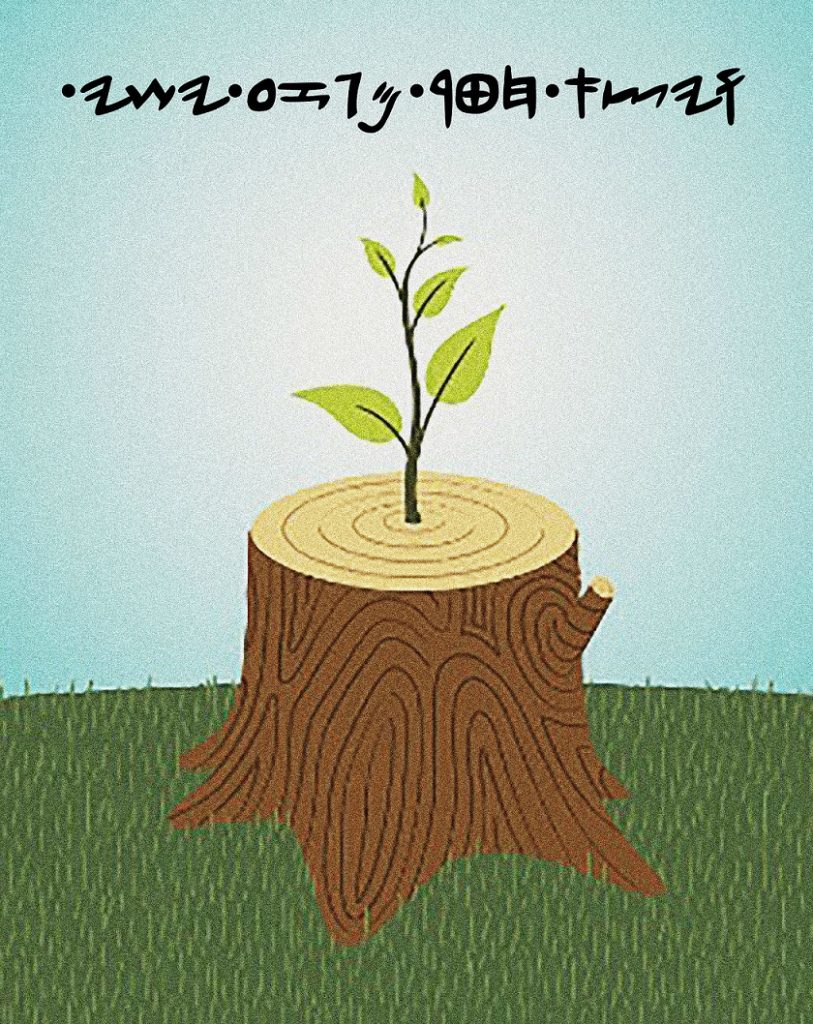

[1] wA-yats’ khatar ma-gazai Yash-Ya’oh wa-natsar ma-sharashay’o yaparah
there will go forth a twig from the stock of Yash-Ya’oh, and a tree branch from his roots will bear fruit
[2] wA-nakhah ghalay’o rokh YA’OH rokh khachamah wa-baynah rokh ghatsah wa-gaborah rokh daith wa-yar’ath YA’OH
and it will rest upon him the wind of YA’OH: the wind of wisdom and understanding; the wind of counsel and might; the wisdom of knowledge and the fear of YA’OH
[3] wA-haraykho ba-yar’ath YA’OH wa-la la-mar’ah ghaynay’o yashapot wa-la la-mashamai azanay’o yochaykh
and when he causes to smell it is by the fear of YA’OH; and not to the seeing of his eyes will he judge; and not to the hearing of his ears will he reprove
COMMENTARY OF YASHAI-YA’OH 11:1-3
[Verse 1] The Ghabaray (Hebrew) name spelled y-sh-y (and mispronounced as Jesse in English) is an abbreviated theophoric name: y-sh-y-h-w (or) y-sh-y-h, i.e. Yash-Ya’oh (“there is YA’OH”). Some may object on grounds that this is just conjecture, but the orthography y-sh-y would otherwise have no known etymology if the last letter is not a diminutive for the divine name element which is very common in biblical theophoric names. Yash-Ya’oh is the simplest and most plausible etymology.
Yash-Ya’oh was the father of King Do’ayd (David), the founder of the Do’ayd dynasty of kings from the tribe of Ya’ohdah. Since the prophet Yashai-Ya’oh tells us in the beginning of his book that he was active during the reigns of the kings Ghaz-Ya’oh (Uzziah), Ya’oh-tham (Jotham), Akhaz, and Khazak-Ya’oh (Hezekiah), i.e. four generations of kings of Ya’ohdah from the paternal lineage of Do’ayd, the khatar (twig) that will go forth from the gazai (stock) of Yash-Ya’oh is evidently a future paternal descendant of Khazak-Ya’oh who will follow in the footsteps of his paternal ancestors and become king. The future king will be a natsar (tree branch) from the roots of Yash-Ya’oh who will bear fruit, meaning he will be a righteous king.
The following chart shows all of the kings of the House of Do’ayd who succeeded him and sat on his throne in Yaroshalam.
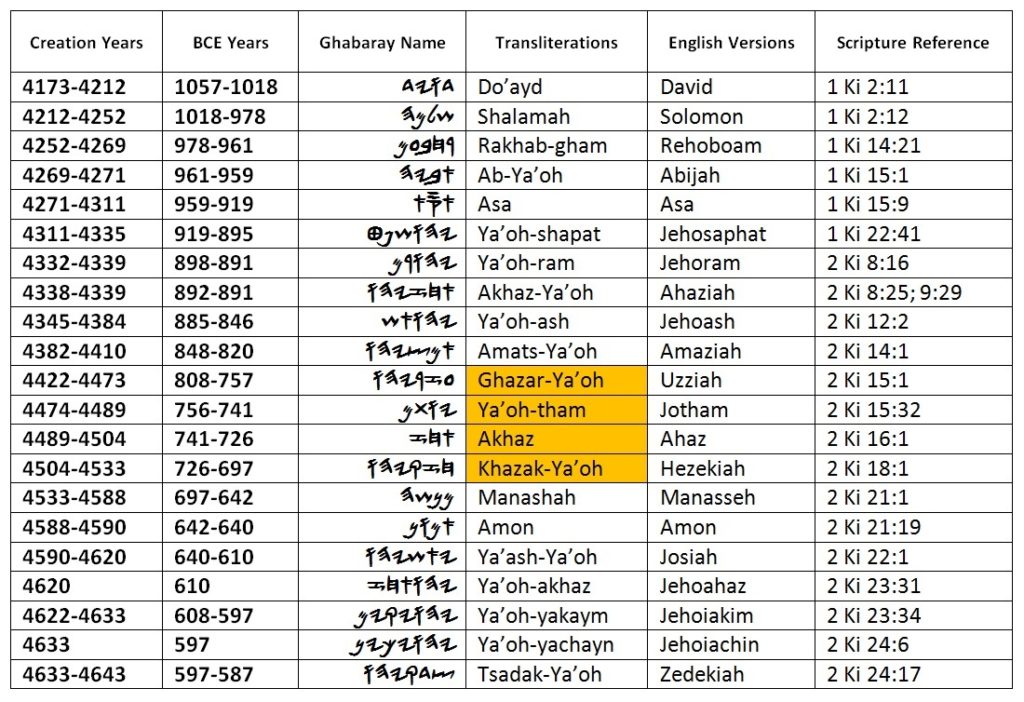
We must also notice that by calling the future man a khatar ma-gazai (twig from the stock) the prophet Yashai-Ya’oh was using an example from nature to relay that the dynasty of Do’ayd was going to fall into ruin and cease to exist, which did in fact happen in 587 BCE. The gazai (stock) is a dead tree trunk in the ground (Ay’ob 14:8) and the khatar (twig) is a new twig or sprout that grows out of it. This phenomenon is called epicormic growth or suckering and it is not unusual.
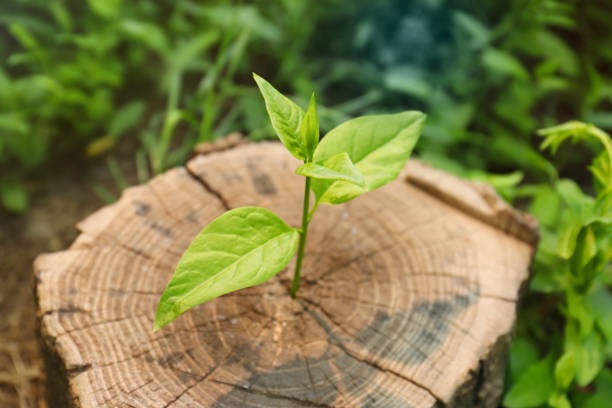
This happens, for example, when lightning strikes a tree, destroying it, or when a tree is cut down by people, and only the trunk is left in the ground. The tree has died but the roots of the dead trunk still have a little bit of energy left in them to send forth twig sprouts. Unfortunately, the stock of the dead tree trunk is not a good placement for the new growth. The wood will be weaker and generally doesn’t survive long term. In order for the twig to grow and become a strong and fruitful tree it must be CUT OFF from the dead stock of the trunk and be replanted in the ground. Did you hear what I just said? I hope you are listening and paying careful attention.
If my people would only take the time to learn their language, and analyze the power and the richness it holds when the prophets write in it, they would see so much light, and they would not be in so much confusion.
[Verse 2] The rokh (wind) of YA’OH is not a person, it is an “it.” It is the invisible power and force that emanates from the person of YA’OH like wind, and it will rest upon the future man, endowing him with wisdom, understanding, counsel, might, knowledge, and the fear of YA’OH which is the beginning of wisdom. Notice that verse 2 is describing a very gifted man with an illustrious pedigree, but that man is not a king, i.e. he is still a khatar (twig) in the stock of a dead tree trunk.
[Verse 3] The causative infinitive construct haraykho (he causes to smell) in this verse is from the root raykh is an indication that the future man’s sense of smell will override what his eyes and ears tell him when he is making decisions and judgments. This is another way of saying that his discernment, figuratively speaking, is his nose to the wind and the wind his nose smells is the wind of YA’OH. He will not rely on just his own ability to judge and to reprove. The fear of YA’OH will prevent him from turning his nose to smell any other wind.

[4] wA-shapat ba-tsadak dalaym wA-hochaykh ba-mayshor la-ghano’ay arats wA-hachah arats ba-shabat pay’o wa-barokh shapathay’o yamayth rashai
and he will judge by righteousness the poor ones, and he will reprove by equity for the meek ones of earth; and he will smite a land by the rod of his mouth; and with the wind of his lips will he kill the wicked
[5] wA-hayh tsadak azor mathanay’o wa-ha’amonah azor khalatsay’o
and it will be, righteousness is the girding of his waist; and faithfulness is the girding of his abdomen
[6] wA-gar za’ab gham chabash wa-namar gham gaday yarabats wa-ghagal wa-chapayr wa-maray’ yakhado wa-nair katan nahg bam
and will dwell a wolf with a lamb; and a leopard with a kid of the goats will recline; and a calf, and a young lion, and a fatling together; and a small youth will lead them
COMMENTARY OF YASHAI-YA’OH 11:4-6
[Verse 4] A king reigns in righteousness when the wicked have been removed from before their throne (Mashlay 25:5). Once the future man has ascended the throne of his father Do’ayd in Yaroshalam he will judge the poor and reprove by equity on behalf of the meek of the earth. Notice that verse 4 is describing the man behaving as a king and not just a gifted man touched by the wind of YA’OH. The khatar (twig) has evidently been cut off from the dead tree trunk and has been replanted.
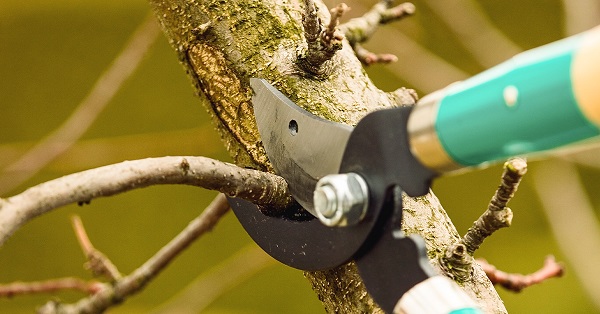
Am I suggesting that the man in verses 1-3 is to be cut off, buried (i.e. planted) in the ground, raised to life again, and that one day he will reign as king according to verse 4? Yes. That’s exactly what the prophet Yashai-Ya’oh is saying, because as any knowledgeable agriculturalist will tell you, a khatar in a dead stock of a tree trunk cannot grow to become a strong and fruitful tree unless it is cut off in death and replanted in the ground.
Notice that his being cut off has absolutely nothing whatsoever to do with saving anyone from their sins. This is about rejuvenating the royal dynasty of Do’ayd which YA’OH swore to Do’ayd that it would last for ever (2 Sam 7:16, 25, 29), and YA’OH does not lie or go back on His word. The only royal lineage of Do’ayd to continue after the killing of King Tsadak-Ya’oh (Zedekiah) and all of his sons by the Babylonian King Nabochadnezzar II was the lineage of King Ya’oh-yachayn (Jehoiachin). The man to restore the dynasty must therefore be a direct patrilineal descendant of Ya’oh-yachayn, and he must be exceptional. He must be cut off and die without becoming king, fulfilling the curse of his forefather Ya’oh-yachayn (Yaram-Ya’oh 22:24-30), and he must come back to life free and clear of that curse in order to rightfully ascend the throne of his forefather Do’ayd in the city of Yaroshalam.
The future khatar will become a natsar (tree branch) bearing fruit when wickedness is removed from before his throne on the day of his accession. The dalaym (poor ones) and the ghanaym (meek ones) are his subjects who anticipated the day of his coronation. The land he smites with the rod of his mouth and the wicked he kills are those who were not genuinely interested in his kingdom and mistreated his future subjects prior to his accession. The visible coming of the man who is to be king will be subsequent to the coming of YA’OH (Danay’al 7:9-14), and the coming of the man to be enthroned as king on Do’ayd’s throne will also be when those of the resurrected dead are either ushered into the kingdom or ushered into eternal damnation (Danay’al 12:2). This judgment is to be based upon how each group of resurrected dead treated the least of that man’s brothers of the same race, i.e. the dalaym and the ghanaym of Ya’oh-shar-al (Mathath-Ya’oh 25:31-46).
[Verse 5] Unlike today, kings in the ancient world were also warriors who led their armies into battle wearing battle armor. The word mathanaym refers to the waist and the pelvis region below the abdominal cavity. A warrior girds up his mathanaym by binding his sword and its sheath around his waist (Nakham-Ya’oh 4:18). The word khalats refers to the entire abdomen between the thorax and the pelvis, i.e. the front part of the abdominal segment of the torso. The batan is the lower area of the abdominal cavity. The organs of the abdomen which are the small intestines, stomach, liver, colon, spleen, pancreas, gallbladder, kidneys, rectum, urinary bladder, ovaries and fallopian tubes in women, are not protected by the skeleton. A puncture to a vital organ in the abdomen from a knife, a spear, or a sword will lead to a fatality, and thus a warrior girds up his abdomen because of this.
When a woman is in labor pain she does not put her hands on her vagina to try and cope with the pain. She puts them on her khalats (abdomen). Yaram-Ya’oh 30:6 states that men in pain put their hands on their khalats the same way women in labor pains do. This proves that the khalats is not the groin. Ay’ob (Job) did not have the private parts of his groin exposed when YA’OH spoke to him in Job 38:3 and 40:7. He simply wanted Ay’ob to prepare to be challenged with hard questions and for Ay’ob to accept this challenge and to act as if he were going into battle like a warrior who needs to put on abdominal armor to protect his vital organs.
All of that to say that girding the khalats means a warrior is putting on abdominal armor to protect the organs in his abdominal cavity. The future warrior-king from the patrilineal lineage of King Do’ayd will gird up his mathanaym and his khalats not just with literal body armor but with righteousness and faithfulness, respectively. These will be protecting him from corruption and from the abuse of power that monarchs having absolute power have become infamous for.
[Verse 6] His kingdom on earth will witness a complete reversal of the natural order that now exists. Carnivorous wild animals will not be a danger to humans anymore because they will be restored to become herbivores once again, as it was in the beginning of the creation (Thorah 1.1:29-30). The mistake people make when reading this verse and thinking it must be symbolic is that since plant life, as we now know it today, does not have what carnivorous animals need in order to survive this verse should not be taken literally at face value. They are wrong. The ground was cursed when Adam and his wife violated the directive given to them (Thorah 1.3:17-19), and that meant the earth would no longer produce the kind of plant life many animals need and these animals had no choice but to become carnivores as a result. YA’OH is even the one who reprogrammed certain animals and taught them to be hunters for this very reason. Everything was made by Him and belongs to Him, and He can change what He made whenever He chooses.
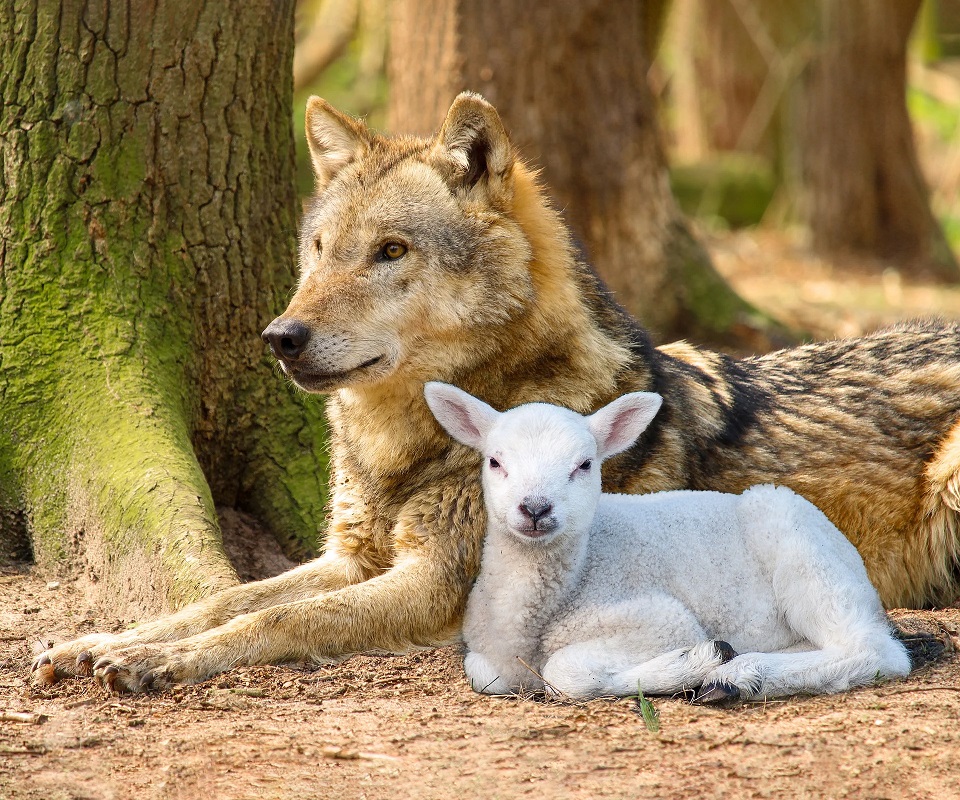
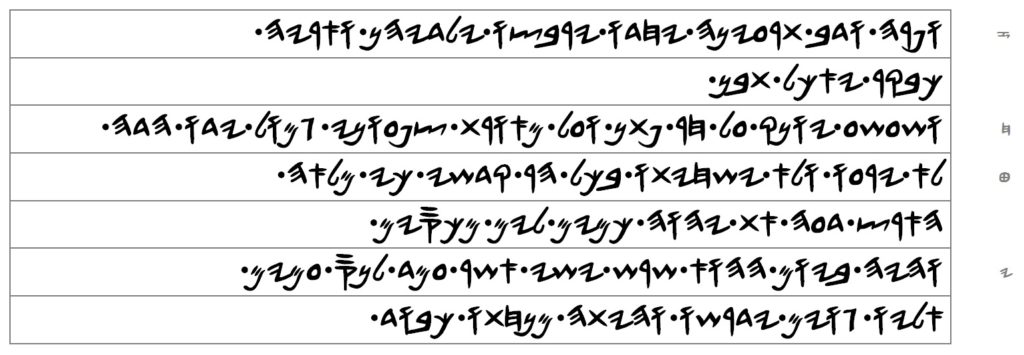
[7] wa-parah wa-dab tharai’aynah yakhado yarabatso yaladay-han wa-arayh cha-bakar ya’alach thaban
and a cow and a bear, they will feed; together will their children recline; and a lion like an ox will eat straw
[8] wa-shaishai yonak ghal khar pathan wa-ghal ma’orath tsapai’onay gamol yado hadah
and the suckling will delight upon the hole of an asp; and upon the light-hole of the viper the weaned child put forth his hand
[9] la yarai’o wa-la yashkhaytho ba-chal har kadashay chay mal’ah ha-arats daihh ath YA’OH cha-maym la-yam machasaym
not will they cause evil, and not will they destroy in all my holy mountain; for the earth has filled up knowledge – YA’OH – like the waters to the sea are the coverings
[10] wA-hayh ba-yom ha-ho’ sharash Yash-Ya’oh ashar ghamad la-nas ghamaym alay’o go’aym yadarasho wA-haythah manakhatho chabod
and it will be in that day the root of Yash-Ya’oh which is the one standing for an ensign of nations; to it the people will seek, and it will be that his rest is glorious
COMMENTARY OF YASHAI-YA’OH 11:7-10
[Verse 7] The earth will be rejuvenated. Wild animals will not hunt each other for food anymore. Amino acids like taurine which is so vital to the diet of big cats will not only be found in seaweed which lions have no access to in the wild, but will be abundant in the plant life on land such as thaban (straw) in the new world to come. In other words, thaban that grows in the world to come will not be the same as it is today. The biology of plant life will be changed by the one who created biology.
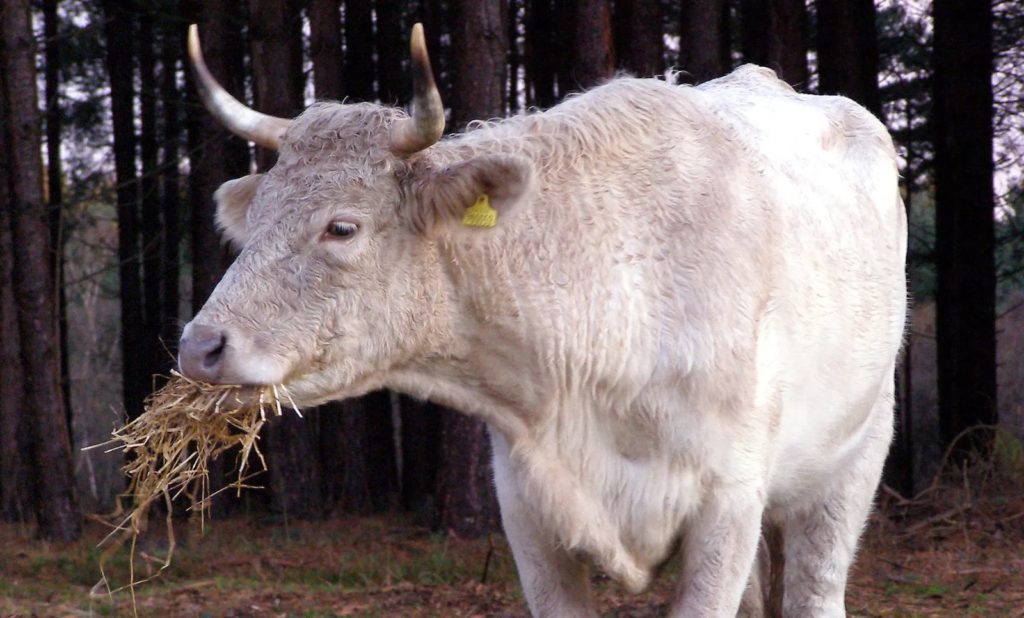

[Verse 8] Children will have no fear of wild animals as they will become completely harmless and playful.
[Verse 9] The earth is the subject of the active verb mal’ah (it has filled) in the 3rd person feminine singular. The earth is doing the action of filling up knowledge, and that knowledge is YA’OH Himself. It is YA’OH putting earth back to its pre-Adam fall state when every living thing on earth is performing exactly the way it was originally designed to perform. This is a full system reboot.
[Verse 10] YA’OH will be the supreme king over all the earth, and the man He puts on the throne of Do’ayd in Yaroshalam will govern the earth as a subordinate of YA’OH. This man’s rest will be glorious and it will never come to an end. YA’OH will keep the covenant He made with Do’ayd which is what the sharash Yash-Ya’oh (root of Yash-Ya’oh) is all about.
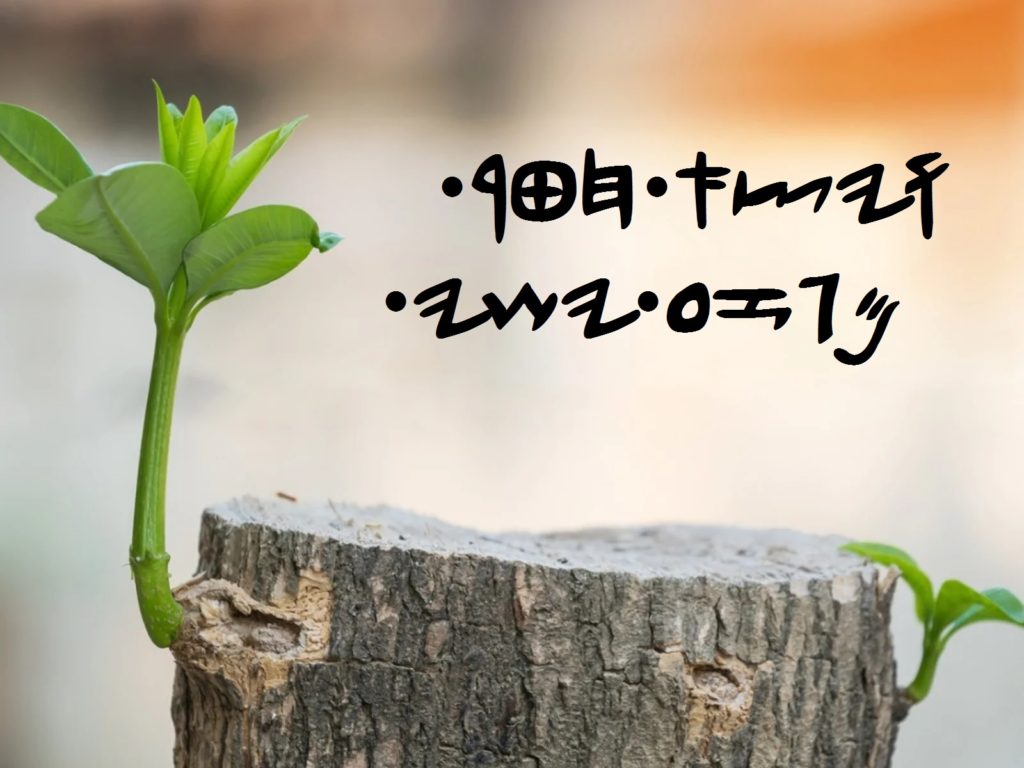

[1] wA-hayh ba-yom ha-ho’ yosayp adanay shanayth yado la-kanoth ath sha’ar ghamo ashar yasha’ar ma-Ashor wa-ma-Matsraym wa-ma-Pathrosh wa-ma-Chosh wa-ma-Ghaylam wa-ma-Shanair wa-ma-Khamath wa-ma-ay’ay ha-yam
and it will be in that day the Lord will cause again a second time His hand to purchase the remnant of His nation which will be left from Ashor, and from Matsraym, and from Pathrosh, and from Chosh, and from Ghaylam, and from Shanair, and from Khamath, and from islands of the sea
[2] wA-nash’ nas la-go’aym wA-asap nadakhay Ya’oh-shar-al wA-napatsoth Ya’ohdah yakabats ma-arabai chanapoth ha-arats
and he will lift up an ensign for the people; and he will gather the thrust out ones of Ya’oh-shar-al, and the dispersed ones of Ya’ohdah will He collect, from the four quarters of the earth
COMMENTARY OF YASHAI-YA’OH 12:1-2
[Verse 1] In the heathen bibles this is verse 11 of chapter 11. However, it is really the beginning of a new section when you examine its details. The first time YA’OH kanah (purchased) His people from foreign lands was the Exodus out of Matsraym under Mashah in the Year 3733 (1497 BCE). The second time He did this was when He made the heathen idol worshiper Cyrus the Great issue a decree in the Year 4711 (519 BCE) which allowed for all the exiles of Ya’oh-shar-al scattered in all four corners of his vast Persian Empire to return to the promised land (2 Chronicles 36:22-23; Ghazar’a 1:1-4; 6:2-5).
The twelve tribes of Ya’oh-shar-al returned to the land and not just the tribes of Ya’ohdah, Ban-yamayn, and Lo’ay (1 Chronicles 9:1-3). They came from Ashor, from Matsraym, from Pathrosh, from Chosh, from Ghaylam (Elam), from Shanair (Shinar), from Khamath (Hamath), and from the islands in the Mediterranean Sea. All of these regions were either conquered by Cyrus, or by his son Cambyses while Cyrus was alive, or they voluntarily submitted to Cyrus without conflict.
[Verse 2] The second purchase of the people of Ya’oh-shar-al is history. It already happened in the 6th century BCE thanks to the decree of Cyrus, and therefore it must not be confused with the coming of the man in chapter 11:1-10 who will sit upon the throne of Do’ayd in Yaroshalam in the future. YA’OH already gathered the nadakhaym (thrust out ones) and the napatsoth (dispersed ones), two different words but describing the exact same thing synonymously, from the four corners of the earth when He made Cyrus king of Persia in the 6th century BCE.
The people teaching from the satanic Greek New Testament that their idol Jessica Christine is going to appear in the clouds in a dramatic second coming and then do verses 1-2 are delusional. The nation of Ya’oh-shar-al is not thrust out and dispersed into the nations listed in verse 1 anymore. They once were but not anymore.
In the centuries that followed the destruction of our nation in 70 CE, our people were herded by YA’OH into western Africa from the four corners of the world, enslaved by the local west African kingdoms (Adomay), and then YA’OH cornered all of them in the land of the pyramids in the New World by orchestrating the trans-atlantic slave trade to bring them there by many ships over a period of many years to fulfill Thorah 5.28:68. This curse does not play favorites. All twelve tribes were put on those ships and anyone who didn’t make the trip did not go on to produce families of the nation who can look back today and say that they escaped this curse. It doesn’t work like that I’m afraid. If His curses dodged your ancestors then you are not His people or He is a liar. You cannot have it both ways.
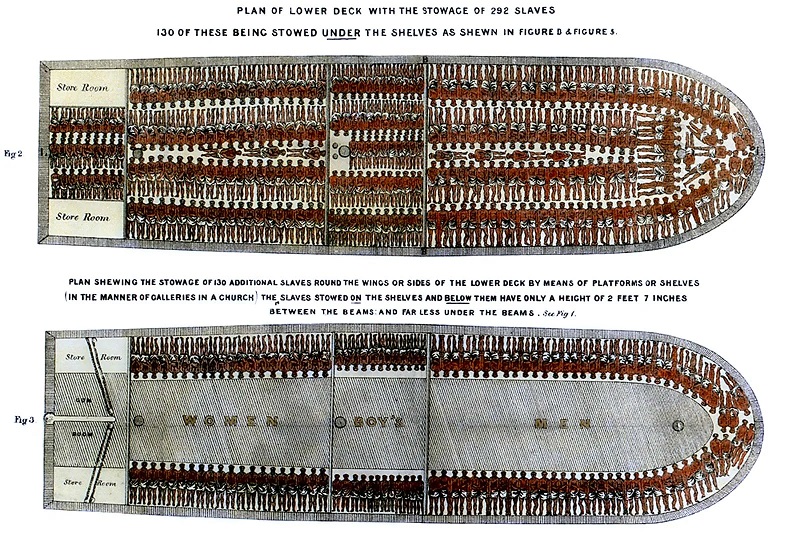
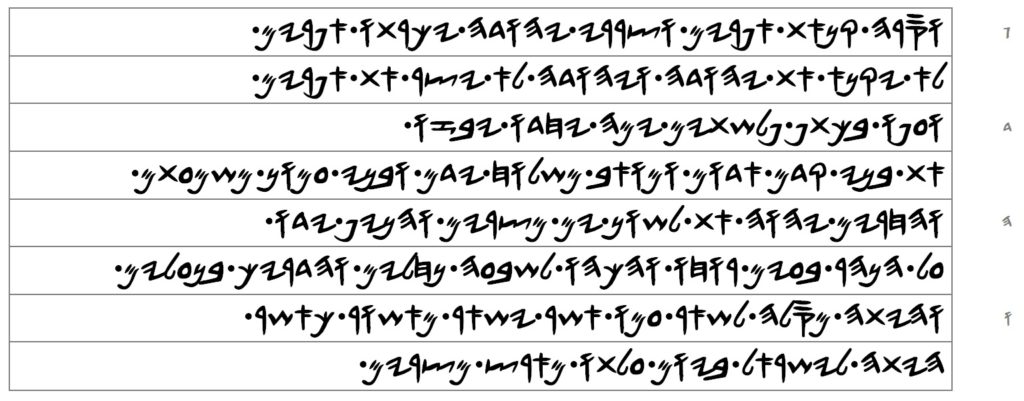
[3] wA-sarah kan’ath Aparaym wa-tsararay Ya’ohdah yacharatho Aparaym la yakan’ ath Ya’ohdah wa-Ya’ohdah la yatsar ath Aparaym
and it will depart the jealousy of Aparaym, and the adversaries of Ya’ohdah, they will be cut off: Aparaym, not will it envy Ya’ohdah; and Ya’ohdah, not will it distress Aparaym
[4] wa-ghapo ba-chathap Palashathaym yamah yakhado yabazo ath banay kadam Adom wa-Mo’ab mashlokh yad-am wa-banay Ghamon mashmaitham
and they will fly on the shoulder of the Palashathaym towards the sea together; and they will spoil the sons of the east; Adom, and Mo’ab is one sending forth their hand; and the sons of Ghamon are the ones obedient to them
[5] wa-hakhraym YA’OH ath la-shon yam Matsraym wA-hanayp yado ghal ha-nahr ba-ghaym rokho wA-hachah-o la-shabaihh nakhalaym wa-hadraych ba-nailaym
and YA’OH will destroy the tongue of the sea of Matsraym; and He will wave His hand upon the river by the might of His power; and He will smite it to the seven channels; and cause to go in sandals
[6] wA-haythah maslah la-sha’ar ghamo ashar yasha’ar ma-Ashor cha-ashar haythah la-Ya’oh-shar-al ba-yom ghalatho ma-arats Matsraym
and there will be a highway for the remnant of His nation which will be left from Ashor, like as it was to Ya’oh-shar-al in the day he came up from the land of Matsraym
COMMENTARY OF YASHAI-YA’OH 12:3-6
[Verse 3] The return of all twelve tribes to the promised land after the conclusion of the Babylonian exile in the 6th century BCE was a unifying moment. The old rivalry between Ya’ohdah in the southern kingdom and Aparaym in the northern kingdom ceased to exist. In fact, everyone in the nation would soon be answering to the term Ya’ohdah as an ethnic and racial designation, regardless of their actual tribe in Ya’oh-shar-al. This is the ultimate origin of the anglicized word “Jews”.
[Verse 4] The return of the twelve tribes back to the promised land following the decree of Cyrus in 519 BCE had implications for the strangers who had moved into our lands in our absence. They now had to vacate our lands. We took back the coastal lands of the old Palashathaym (Philistines). We spoiled the easterners. We subdued the Adomay (Edomites) who moved into the southern territory of Ya’ohdah. We also made Mo’ab and Ghamon (Amon) submit. This is the history of the establishment of our Second Commonwealth in our own land during the period of the Persian and Greek empires.
[Verse 5] Even before I was called to be the ravenous bird I believed this verse was alluding to the Persian conquest of Matsraym by Cambyses in 525 BCE while his father Cyrus was still alive. Nothing has changed.
As I stated earlier, all of the countries mentioned in verse 1 were countries within the empire of Cyrus. He was still alive when his son Cambyses conquered Matsraym (Egypt) and absorbed it into the Persian empire. Don’t repeat to me what European scholars say. I already know what they say. They say Cyrus died in 530 BCE, but they do not believe in the scriptures which emphatically state to the contrary that the year Cyrus issued his decree was the 70th year of desolations in Yaroshalam (2 Chronicles 36:21-23). Those desolations commenced in 589/8 BCE when the Neo-Babylonian army of Nabochadnezzar II attacked and laid siege to Yaroshalam. That means the 70th year of the city’s desolations has to be 519 BCE, which is well beyond the time of the conquest of Matsraym by Cambyses in 525 BCE.
If modern European scholarship is correct and Cyrus was dead before his son Cambyses brought Matsraym into the Persian empire in 525 BCE, why did a still living Cyrus make an idol image of himself as a four-winged genii demon wearing the royal Egyptian hemhem crown, a crown which is only worn by kings of Matsraym? What is he doing with an Egyptian crown on his head, and why did the historian Xenophon write that Matsraym was conquered by Persia during the lifetime of Cyrus when he knew this contradicted Herodotus, “the father of lies”? You either believe in the scriptures or you don’t. If you believe Cyrus died in 530 BCE five years before the conquest of Matsraym then you don’t believe in the scriptures.
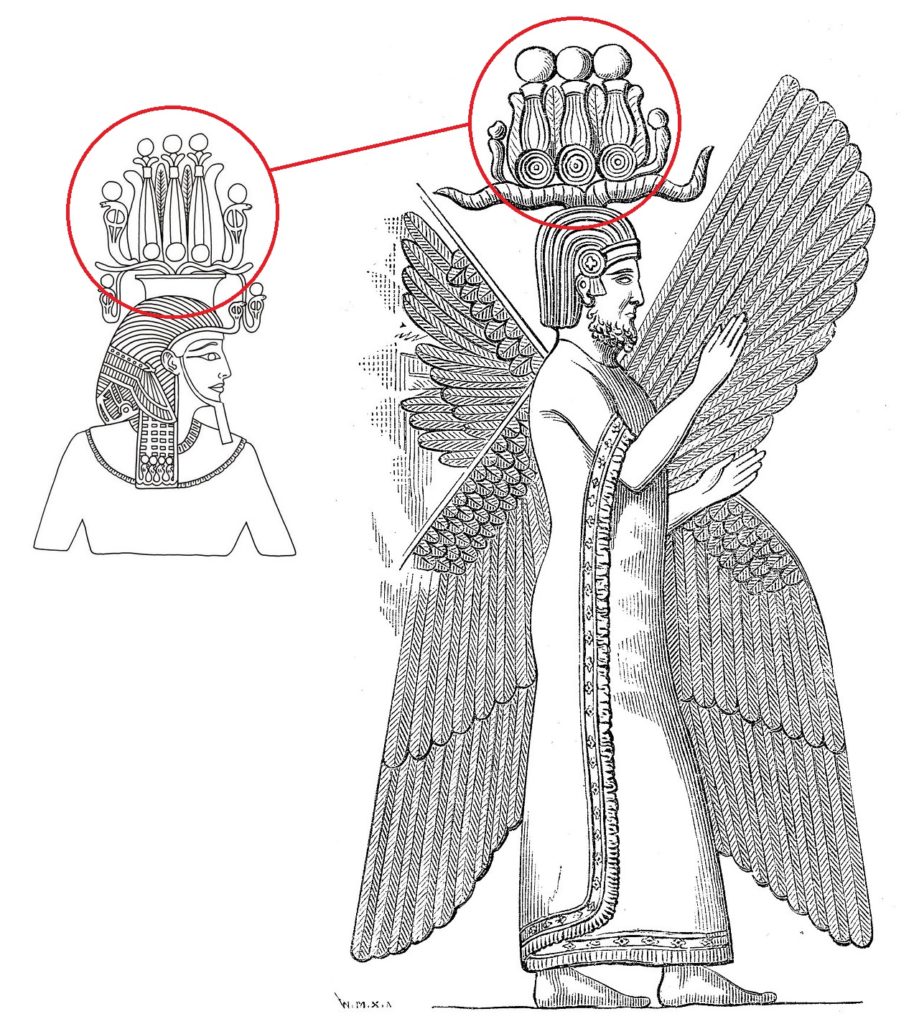
Do not let some ignorant person convince you that Matsraym in the Old World does not have a river with seven channels. Yes it does. The Matsraym of the Old World is not America. Stop entertaining this uneducated illiterate foolishness. The threat in verse 5 is not against literal bodies of water. YA’OH was not angry at a sea and a river! This is figurative talk for the kingdom of Matsraym which YA’OH in the ferocity of His wrath utterly destroyed in 525 BCE by using the Persian army. The conquest of Cambyses was excessive and severe. When he brought down Matsraym in 525 BCE it was like the seven channels of the Nile had went completely dry, so dry that you could walk in them with your shoes on.

[Verse 6] The Assyrian military campaigns against our nation in the 9th and 8th centuries BCE resulted in the scattering of our northern tribes of Ya’oh-shar-al into Assyria, but also into Africa. When the Assyrians conquered Matsraym under kings Assurbanipal and Esarhaddon in the 7th century BCE, many of our exiles in Assyria moved to Matsraym and to points much further south in the Nile Valley. The prophets called this movement in advance and said this would happen. Read Tsapan-Ya’oh (Zephaniah) 3:10; Hoshai (Hosea) 8:13; 9:3; 11:5. Thus, the “Assyrian” was still their king even after they settled in Matsraym. That is what this prophecy is saying and that is what happened. We do not need to wonder and scratch our heads guessing what happened to the northern tribes after the Assyrians took them into captivity. The prophets tell us exactly where they went and even when they went there.
When Cyrus’s son Cambyses conquered Matsraym in 525 BCE that set the stage for our people who were made exiles by the Assyrians centuries earlier, and who had moved to Matsraym following the Assyrian conquest of Matsraym in the seventh century BCE, to return to their own land because Cyrus said they could only a few years later in 519 BCE. His decree literally created a human highway of our people streaming forth out of Africa, and other places, in order to go back to the promised land. This was the second purchasing of the nation by YA’OH that verse 1 (11:11) is talking about.
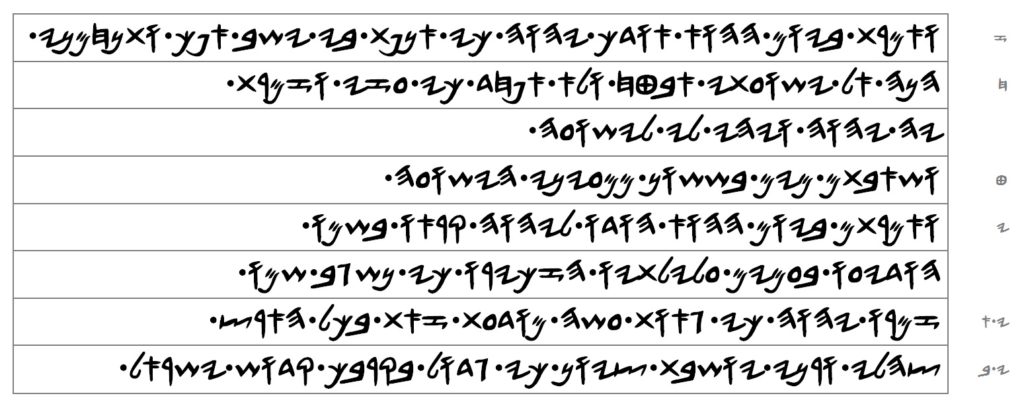
[7] wA-amartha ba-yom ha-ho’ ‘od-cha YA’OH chay anaptha bay yashab ap-cha wa-thanakham-nay
and you will say in that day: I will praise you YA’OH, for you were angry at me; it was turned, your anger; and you will comfort me
[8] hanah al yasho’aithay abatakh wa-la apakhad chay ghazay wa-zamarath yah YA’OH wa-yah’ay lay la-yasho’aihh
behold, the Higher Power of my salvation! I will trust and not will I be afraid; for my strength and song is yah YA’OH; and He became to me for salvation!
[9] wA-sha’abtham maym ba-shashon ma-mai’aynay ha-yasho’aihh
and you all will draw water in joyfulness from the wells of the salvation
[10] wA-amartham ba-yom ha-ho’ hodo la-YA’OH kara’o ba-shamo hoday’ai’o ba-ghamaym ghalaylathay’o hazchayro chay nashagab shamo
and you all will say in that day: Give thanks you all to YA’OH! Call you all upon His name! Make it known you all among the nations the acts of His! Memorialize you all that inaccessibly high is His name!
[11] zamaro YA’OH chay ga’oth ghashah modaith za’ath ba-chal ha-arats
Sing you all – YA’OH! Because excellent things has He done! This is known in all the earth!
[12] tsahlay wa-ranay yoshabath Tsayon chay gadol ba-karab-ach kadosh Ya’oh-shar-al
shout out loud and sing, inhabitant of Tsayon, for great in the midst of you is the Holy One of Ya’oh-shar-al!
COMMENTARY OF YASHAI-YA’OH 12:7-12
[Verses 7-12] The last six verses of the chapter are the prophet anticipating the gratitude and thanks on the part of our people in the 6th century BCE when YA’OH purchased them from foreign exile for the second time. We were not there so we cannot know exactly what the prevailing sentiment was when our people witnessed YA’OH keep His word to the prophet Yaram-Ya’oh that the exile would only last seventy years from the siege of Yaroshalam in 589/8 BCE and then they would be able to return to the land and start over again. However, I have a feeling that the prophet hit the nail right on the head in these last six verses in regards to the general sentiment, at least for those first few decades of the restoration.
There is now a third and final purchasing of the remnants of the nation that is underway as we speak. The second restoration in the 6th century BCE, as exciting as that must have been to be a part of in its early years, was only temporary. The Romans came and destroyed our nation five centuries later in 70 CE.
However, the restoration that is taking place now is establishing a kingdom in the second wilderness that will never be destroyed. That kingdom will transfer from the wilderness to the promised land after a time, times, and a half, and it will be there awaiting the return of the natsar from the root of Yash-Ya’oh. He will come and he will receive the kingdom from YA’OH (Danay’al 7:14) and he will sit and reign for ever upon the throne of Do’ayd in Yaroshalam exactly as YA’OH promised Do’ayd in 2 Sam 7:16. Your Rock keeps His word to His servants, and your Rock has a fearful and glorious name.
His name is YA’OH
Always has been. Always will be.
#EXODUS2023
1.15.7252 (April 5, 2023)
